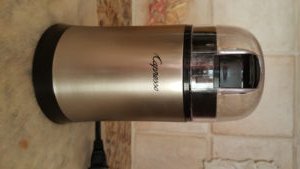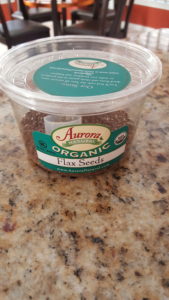Sometimes people with hypertension wonder if there are natural ways to lower their blood pressure. It turns out that for some, yes there are several different things that can tried, but from that list, one things is often left out: Flaxseed. Can flaxseeds lower blood pressure? Over the last several years, multiple studies have suggested that flax seeds can significantly reduce blood pressure. Let’s now look at one of the most interesting flax/blood pressure studies done to date to give you a better idea of how much these tiny seeds might help you.
Flaxseed Blood Pressure Research
While there has been previous animal research on this issue, most of those reading this are people (I hope), so let’s look at a very intriguing human study. It was titled Potent Antihypertensive Action of Dietary Flaxseed in Hypertensive Patients. The study involved 110 people who had high blood pressure and peripheral artery disease (PAD). The average age of the people was 67. There were no significant differences between those getting flaxseed and those getting the placebo.
In PAD, people experience pain when they walk. This is due to blood vessels in the legs being clogged with plaque. PAD -like high
blood pressure – is a risk of heart attacks and strokes.
Of those people in this study, 90% were current or ex-smokers, 75% were taking high blood pressure medications , 32% were diabetic and 79% were taking medications for cholesterol.
In other words, this was a group that had serious health issues. That is what makes this study interesting to me. It involved real life people.
For 6 months, the researchers randomly gave people foods (muffins, pasta, bagels etc) that contained either ground ground flaxseed or a placebo (wheat was the placebo). The amount of ground flaxseed used was only 30 grams per day, so it was not much. To put things in perspective 30 grams is about 1 ounce. (28 grams = 1 oz)
In real-life terms, 30 grams is about 2 tablespoons of ground flax seeds.
People were instructed to eat only 1 of the foods per day (so 30 g total for the day).
During the 6 month study, blood pressure and various blood tests were taken to see if flaxseed was having any effects.
Study Results
After 6 months, 13 people from the flaxseed group dropped out of the study. In the placebo group 11 people dropped out. It was a similar dropout rate between groups (22.4% and 21.2% respectively) so this doesn't appear to have impacted the results.
There was no difference in body weight between the groups. This is good because weight loss is known to lower blood pressure. By having no differences in weight loss between the flaxseed group and placebo group, this takes weight loss out of the equation.
The big finding in this study was the blood pressure change. Those getting 30 grams of ground flaxseeds a day saw significant decreases both systolic and diastolic blood pressure.
How much? After 6 months:
- Systolic blood pressure (the top number) dropped an average of 15 points.
- Diastolic blood pressure (the bottom number) dropped an average of 7 points.
To drive home the importance of this result, the authors point out that 10 point drop in systolic blood pressure could decrease heart attacks by 27% and strokes by 36%.
They go on to say that a 7-point drop in diastolic blood pressure would be expected to reduce heart disease by 29% and stroke by 46%.
These are drug-like effects – but from a food!
The result was so significant that 8% of those getting flax seeds were able to reduce their dosage of high blood pressure medications.
What About The Placebo Group?
Did the placebo group see any changes in blood pressure? No. Those getting the placebo saw no significant changes in either systolic or diastolic blood pressure.
So What Caused The Decline In Blood Pressure?
Flaxseeds – like all foods – are not just a single ingredient. Therefore it’s not possible from this study to know if the blood pressure-lowering effect was due to:
- Lignans (hormone-like compounds)
- ALA
- Fiber (soluble and insoluble)
Or a combination of all of the ingredients? That will take future research.
It's worth pointing out that the results of this study are supported by a 2016 review of other studies that also noted a blood pressure-reducing effect from flaxseeds.
Lowering Blood Pressure Naturally (Video Review)
What Kind Of Omega 3s?
Flaxseeds contain an omega-3 fatty acid called Alpha-Linolenic Acid (ALA). This is different than the omega 3 fats in fish and fish oil supplements (EPA and DHA). Humans can transform some ALA into EPA and DHA but it's a tiny amount. That said, the researchers did find a significant increase in EPA in those getting flaxseeds (no such change in the placebo group).
Grinding Flaxseed Is important
Flaxseeds are small and it's unlikely we could chew them enough to get their nutrients. If we can't break open their outer shell, we can't obtain their nutrients. So, if you're not going to use milled flax, you have to grind them yourself. In this study they used the phrase “milled flaxseeds” but milled is another name for ground. So, this study used ground flaxseeds. Fortunately, for those who don't want to grind them, they don't have to…
How Do You Grind Flaxseeds?
If your going to do it yourself, one of the easiest ways is to use an electric spice grinder. Fortunately, they are not expensive. Coffee grinders work just as well but remember if you use the same grinder for coffee and spices, your spices may have a coffee taste. The picture to the right is my spice grinder.
use the same grinder for coffee and spices, your spices may have a coffee taste. The picture to the right is my spice grinder.
I like to put ground flaxseeds on my oatmeal.
My Protein Flaxseed Oatmeal Recipe
Here is a recipe that I enjoy making – and eating:
- ½ cup of oatmeal (or oat bran cereal)
- 1 scoop of chocolate flavored Muscle Milk
Microwave for 1-2 minutes and after that add:
- 1 tablespoon of ground flaxseeds
- 1 tablespoon of wheat germ
- A handful of chopped /diced walnuts (optional)
- 1-2 scoops of frozen blueberries
It takes under 5 minutes to make this. Do you need the chocolate muscle milk protein powder? No. I use it because it adds about 15 grams of protein, microwaves well and because I just like chocolate-flavored oatmeal.
So, Do Flaxseed Help Blood Pressure?
According to this study, adding 30 grams of ground flaxseeds appears to significantly reduce blood pressure in people with hypertension. It may take a few months to notice a reduction in blood pressure, but given the relatively low risk of flaxseeds, for those, with hypertension, it might be worth a try.
 blood pressure – is a risk of heart attacks and strokes.
blood pressure – is a risk of heart attacks and strokes.
I am on high blood pressure medication can I take flaxseed?
Hi NAZ, first let me tell you I’m not a doctor or pharmacist. That said, I’m not aware of any interaction between high blood pressure medicine and flaxseeds. There are different kinds of high blood pressure medications and sometimes food can interfere with medicine absorption. Because of this, I suggest you ask your doctor and pharmacist what they think about trying flaxseed to help your high blood pressure.
Do let us know what they say and if you try it, how it worked for you.
Joe,
Two tablespoons is an ounce. Four would be 2 ounces. Most people probably do better if they gradually increase their dosage of flax, as tolerated.
Hi Judy, thanks my typo is corrected. Appreciate you pointing that out.